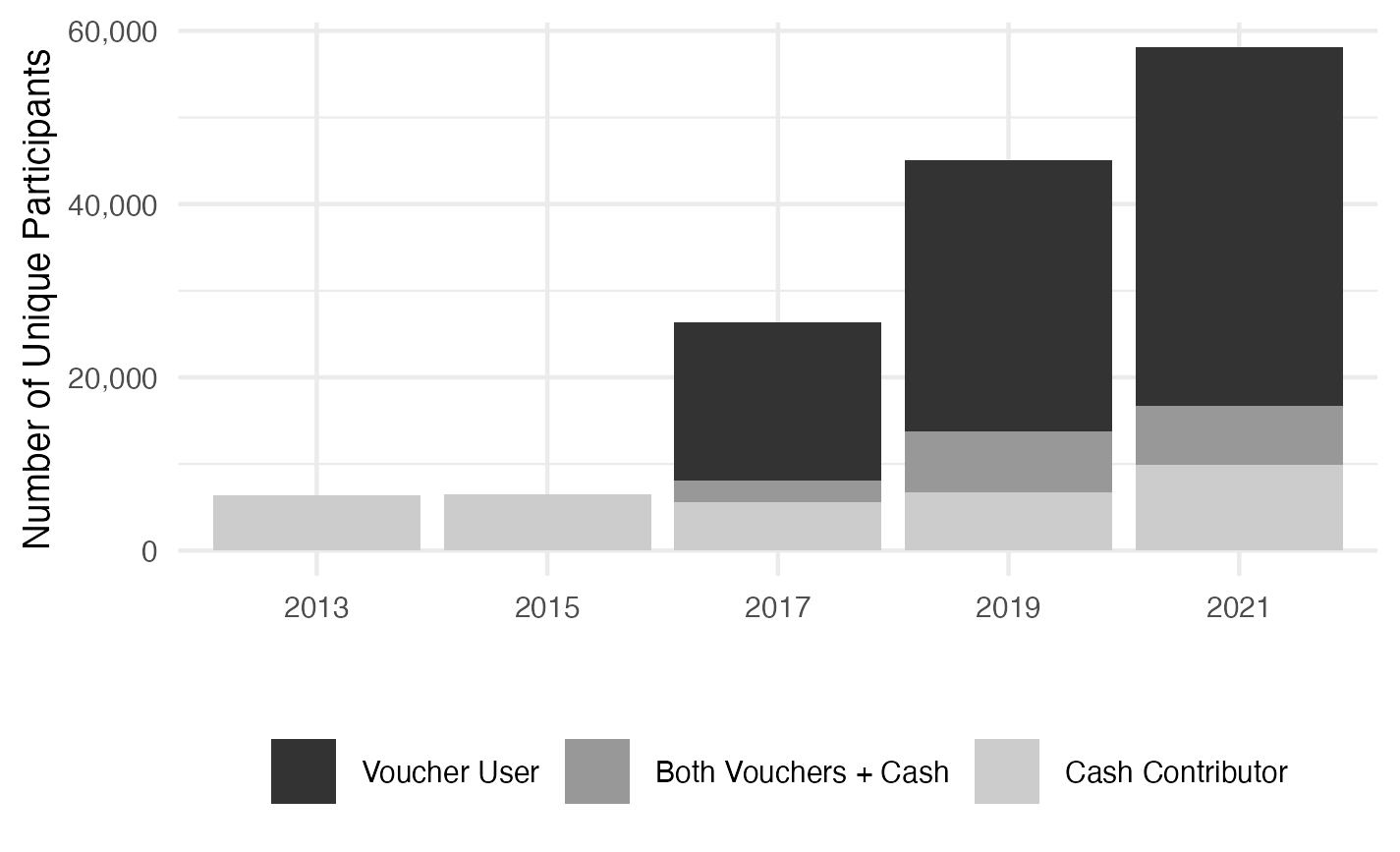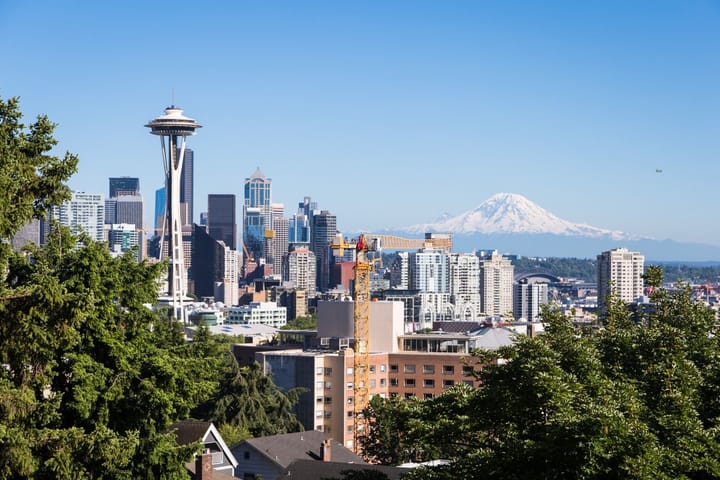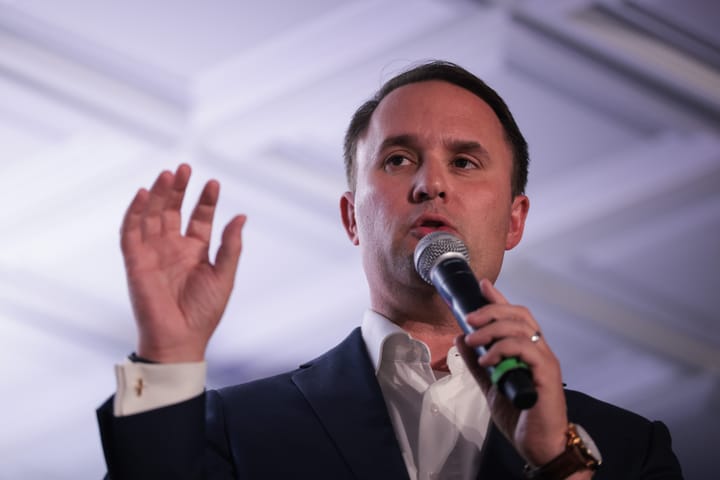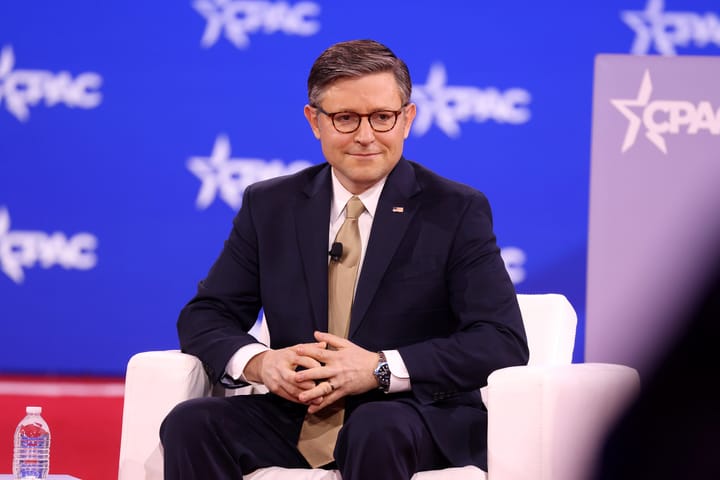Since 2017, Seattle has offered residents a first-of-its-kind way to expand their participation in local elections. Through the city’s Democracy Voucher Program, every registered voter receives four $25 vouchers in the mail that can be donated to participating candidates for mayor, city attorney, or city council. The vouchers can be redeemed by the candidates for campaign funding.
Seattle’s experiment aims to bolster local engagement by helping more candidates fund their runs for office with support from everyday voters, reducing reliance on wealthy donors—and broadening the donor pool to be more reflective of the city’s population.
Now in its fifth election cycle—and second mayoral cycle—Seattle's voucher program is a pioneering effort to democratize campaign finance. Alongside the mayor’s race, this year’s ballot includes contests for city attorney and three city council seats, two of which are at-large.
The Aug. 5 primary ballot also includes a crucial funding question for the future of Seattle’s program: voters will decide on whether to renew the program’s funding source, which was originally passed by voters for a 10-year period. A coalition of grassroots groups, People Powered Elections Seattle, is advocating for the program’s renewal, citing the program’s success in countering political inequality.
So, how has Seattle’s democracy voucher program worked? A new book, Democracy Vouchers and the Promise of Fairer Elections in Seattle, presents a comprehensive look at how the program has reshaped local campaign finance. Co-authored by Dr. Jennifer A. Heerwig, an associate professor of sociology at Stony Brook University, and Dr. Brian J. McCabe, an associate professor of sociology at Georgetown University, the research highlights a dramatic uptick in small-dollar participation and increased diversity among donors.
“There’s been a huge increase, I would even say an explosion, in participation in local campaign finance, with lots of folks using their vouchers and becoming active and financing candidates that they're excited about running for their local races,” said Heerwig in an interview with Sludge.
“The program has significantly increased the number of new small donors financing local elections,” Heerwig said.
To qualify for the voucher program, candidates for mayor, city attorney, and city council must first demonstrate a threshold of support through gathering signatures and small contributions from Seattle residents. Further, candidates who opt-in agree to take part in several public debates, with the funding totals they’re awarded from vouchers displayed online, up to a maximum they can raise.
The voucher program has been popular with candidates: between 2017 and 2024, 76% of primary candidates and 89% of candidates on the general election ballot participated.
Democracy vouchers also saw a surge in the percentage of voters using them: by 2021, the share of Seattle’s registered voters that were active in local campaign finance reached nearly 10%, Heerwig and McCabe’s research found.

That rate beats even the longstanding program in New York City, which in 2021 saw 8% of donors giving in the city’s public matching funds system, which was strengthened by voters in a 2018 referendum.
The book's research brings a focus to Seattle’s voter participation in terms of age, race, and income, and tracks gains in program participation across all three metrics from 2017-2021. Though the vouchers are still used at higher rates by white, older, and more affluent Seattleites, the gaps in the program participation rate for people of color, younger, and lower-income citizens are now significantly smaller than they are compared to cash donors, Heerwig and McCabe write.
Being able to fund a campaign through small-dollar donations, via democracy vouchers donated at the neighborhood level, makes it possible for grassroots candidates to run in Seattle—and the book’s research, surveying the program’s effects, shows changes in the candidate pool. Mayoral and city council candidates have become more diverse in terms of age, race, and gender, with winning candidates being almost eight years younger than they were before vouchers were on offer, Heerwig and McCabe found. This year, as in Seattle’s 2021 citywide race, almost all major mayoral candidates in the nonpartisan election have opted-in to participate in the public campaign financing program.
Seattle’s program was the model for a “democracy dollars” public campaign financing option passed by Oakland voters in 2022 with 74% in favor. The program is expected to launch in 2026, after this summer’s city budget is adopted.
Up for Renewal in August
To continue funding the Democracy Voucher Program, the Seattle City Council voted unanimously to place an ordinance on the August ballot that, if approved, would renew a property tax levy that raises around $4.5 million annually for another 10 years. The measure, which generally keeps the program in line with its current operations, costs the average Seattle homeowner about $13 per year, according to People Powered Elections Seattle. Some of the state coalition’s members supporting the program’s renewal include the League of Women Voters of Seattle King County, Fix Democracy First, and the Washington Community Alliance Action Fund, a statewide group led by communities of color.
“In this time of national threats to democracy, Seattle is taking a bold stand,” said Kamau Chege, executive director of the Washington Community Alliance. “The renewal of the Democracy Voucher Program is an investment in the future of our city, ensuring that everyone—regardless of income—has an equal voice in our elections.”
A 2022 report from Seattle Ethics and Elections Commission (SEEC), the nonpartisan and independent commission that administers the program, found that the share of contributors from outside Seattle for at-large city council seats fell after the program’s debut in the 2017 cycle, from 31% to around 7%. The finding underscores how Seattle’s program helps campaigns be more responsive to their localities and spend more time meeting voters.
“The Democracy Voucher Program has proven to be a transformative tool for our democracy,” said Cinthia Illan-Vazquez, executive director of the Washington Bus, a civic engagement group for young people in the state. “In a time of increasing threats to democracy nationwide, this program is more important than ever. It gives Seattle residents—especially those who have historically been excluded from political power—a stronger voice in how our city is run.”
By Seattle’s 2021 cycle, outside spending on city council races by heavy hitters like Amazon fell when compared with over $4.1 million the company spent on those races in 2019. Washington State advocates say the funding independence offered to candidates through the voucher program has helped to reduce the influence of Big Money donors in the city’s elections.
Renewing the voucher program is supported by Seattle Mayor Bruce Harrell and Councilmember Bob Kettle, and has been cheered by more members on Seattle’s nine-seat City Council, including Alexis Mercedes Rinck and Dan Strauss.
Kim Albert and Barbara Tengtio of League of Women Voters of Seattle King County similarly cheered the City Council’s decision to send the Democracy Voucher Program to voters for renewal. “This program has already made a tremendous difference in diversifying the candidate pool, increasing voter engagement, and making our elections more competitive,” they said.
See more of our past coverage of democracy vouchers here.
🙏🏼 Thank you for reading! With wealthy special interests and billionaire donors dominating election spending, our independent newsletter is covering how small-donor programs are pushing back for a more responsive democracy. This two-person newsletter depends on subscription support from readers like you to relentlessly follow the money in politics—please sign up as a subscriber for full access to our daily reporting and bonus links.
Sludge videos by Spencer Snyder — watch on Instagram and YouTube



